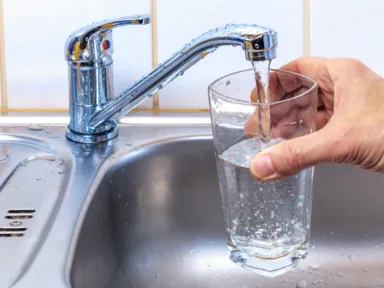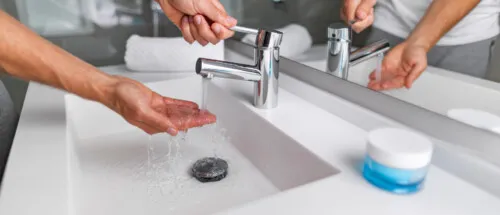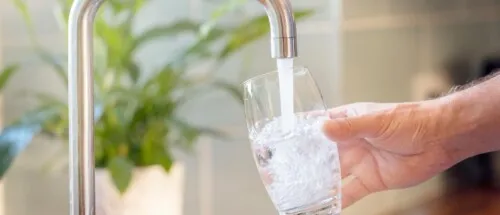Whether you have city water or well water in your home, your drinking water could still benefit from a water filter. They can improve the taste and clarity of your water while also significantly reducing potentially harmful contaminants.
The type of filtration system you’ll need depends on the kind of drinking water you have in your home. You may need a more robust water filter to help remove local chemical contaminants or a specific type of sediment. Generally, there are four types of water filters: carbon, reverse osmosis, sediment, and ultraviolet or UV.
In this article:
- Why Water Filtration Matters
- Types of Water Filters for Your Home
- Which Water Filter Is Right for You?
- Whole-Home vs. Point-of-Use Filters
- Choosing the Best Water Filter
- Frequently Asked Questions
Why Water Filtration Matters
Aside from the health benefits of water filtration, cleaner water also benefits other aspects of your home life. Soft water, for instance, helps maintain or extend the life span of your appliances by reducing the amount of buildup in your systems. Water filtration systems don’t just help with drinking water; they may also make your water safer for other activities like cooking and bathing.
Types of Water Filters for Your Home
Carbon Filters
Also referred to as activated carbon filters, these water filters help remove contaminants by absorbing them into the highly porous activated carbon. A very simple example of this is a Brita water pitcher filter. n
Carbon filters are able to help remove things like chlorine, lead, and miscellaneous odor and taste-affecting compounds in your water. If you’re interested in a more thorough carbon filter system than a pitcher, the water experts at Leaf Home provide advanced carbon filtration options that can be installed directly at the source.
Reverse Osmosis Filters
While its name may make it sound complicated, reverse osmosis (RO) filters are simple. They purify water by pushing it through a semipermeable membrane. When this happens, most of the contaminants are removed.
These water filters can reduce heavy metals, fluoride, and other impurities. Leaf Home Water Solutions’ reverse osmosis systems can help provide higher-quality drinking water straight from the tap.
UV (Ultraviolet) Filters
UV filters neutralize 99.9% of bacteria, viruses, and other pathogens using ultraviolet light, destroying their ability to reproduce. They are ideal for homes with wells, and help users avoid needing to boil for purification during boil water alerts.
Sediment Filters
Unlike the other types of water filters mentioned thus far, sediment filters reduce large matter like silt or sand from the water, usually as a pre-filter. Sediment filters are often used in conjunction with other filtration systems like carbon or reverse osmosis to help fully decontaminate the water for consumption.
Water Softeners
When looking at a water filter versus a water softener, it’s important to know that they are both water treatment systems. However, a water softener targets specific minerals like calcium and magnesium, which are known to contribute to water hardness. Without a water softener, these ions create limescale and buildup, which can shorten the lifespan of your appliances and can cause plumbing issues throughout your home. The water softener solutions provided by Leaf Home can help prevent such damage from hard water.
Which Water Filter Is Right for You?
Choosing the kind of water filter for your home depends on several factors. These include:
- Local water quality
- Your household size and water usage
- Area contaminants
- Whether you have well or city water
Every home is different, and your water filter needs are different, too. That’s why our team is here to help homeowners assess their water quality and recommend the best filtration system based on their needs.
Whole House vs. Point-of-Use Filters
The main four water filters covered so far often come in two types: whole house or point-of-entry. Whole house water filter systems treat water directly from the source, as opposed to point-of-use filters like faucet or under-sink attachments, which only treat water in individual tap water locations.
How to Maintain Your Water Filters
The type of water filtration method you’re using will determine how often you need to replace it. Generally, larger water filters like whole-home filters need to be serviced every 12 months, depending on your household size and local water quality. Things like faucet filters need replacing every two or three months, and pitcher filters are often replaced monthly.
Choosing the Best Water Filter
Between the four types of water filters, there are a lot of ways to purify your home’s water. You can choose from UV, carbon, and reverse osmosis for the more microscopic work and sediment filters for the bigger particles. Every different filter will provide specific, best use cases while targeting different needs in each home. A combination may also work best in certain circumstances.
Using water filters is an easy way to improve water quality throughout your household, and it’s never been easier thanks to Leaf Home Water Solutions. Our water experts can help homeowners find the best fit for their homes and provide maintenance support to help keep your water cleaner and more crisp all year round.
Frequently asked questions
What type of filter is best for drinking water?
Generally, reverse osmosis filters are considered the best water filter for drinking water because they provide a more crisp, refreshing taste.
What are the three types of water purifiers?
The three types of water purifiers are reverse osmosis, ultraviolet (UV), and carbon. Sediment filtration isn’t considered purification because it acts more like a sifter, helping remove undissolved or solid contaminants like silt or sand.
What are the differences between reverse osmosis and carbon water filters?
A carbon filter works by allowing the water’s contaminants to be absorbed into the activated carbon. This absorption reduces contaminants from the water. On the other hand, reverse osmosis pushes the water through a semi-permeable membrane, forcibly separating the contaminants from the water particles.
How do different types of water filters work?
Ultraviolet (UV) filters neutralize microorganisms and viruses from water by destroying their ability to reproduce with powerful light. Reverse osmosis water filters push water through a semi-permeable membrane that separates it from the contaminants. Carbon filters work by allowing the activated carbon to absorb contaminants from the water as it passes through. Sediment filters work by sifting the larger contaminants, like sand, from the water.



